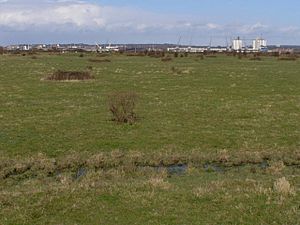Dibden Bay facts for kids
| Site of Special Scientific Interest | |
 |
|
| Area of Search | Hampshire |
|---|---|
| Interest | Biological |
| Area | 229.4 hectares (567 acres) |
| Notification | 2001 |
| Location map | Magic Map |
Dibden Bay is a very special natural area in Hampshire, England. It covers about 229.4-hectare (567-acre) of land. This makes it a significant place for wildlife. It is located between the towns of Marchwood and Hythe.
Contents
What is Dibden Bay?
Dibden Bay is officially known as a Site of Special Scientific Interest (SSSI). This means it is a protected area. The government recognizes it as important for its plants, animals, or geology. These sites are protected by law. This helps to keep their unique features safe.
How Was Dibden Bay Formed?
Much of Dibden Bay was created by humans. It was formed from material that was dug up from Southampton Water. This material was then placed in the bay. Over time, this created new land. This new land became a home for many different creatures.
Why is Dibden Bay Special?
Dibden Bay is very important for its wildlife. It has a huge collection of tiny creatures without backbones. These are called invertebrates. This includes insects, spiders, and worms. Many of these invertebrates are quite rare.
Amazing Invertebrates
Scientists have found many special invertebrates here. There are 21 species that are nationally rare. This means they are very hard to find in the whole country. Another 67 species are nationally scarce. This means they are not common. This makes Dibden Bay a vital place for these small animals.
Home for Birds
Dibden Bay is also a great spot for birds. It is especially important for nesting lapwings. These birds build their nests and raise their young here. In the colder months, many other birds visit. These are called wintering wildfowl.
Winter Bird Visitors
Some of the birds that spend winter at Dibden Bay include:
These birds travel long distances to feed and rest here. Dibden Bay provides a safe haven for them. It helps them survive the winter.

